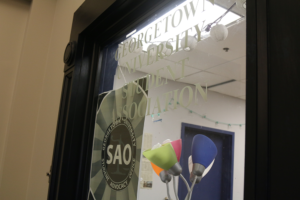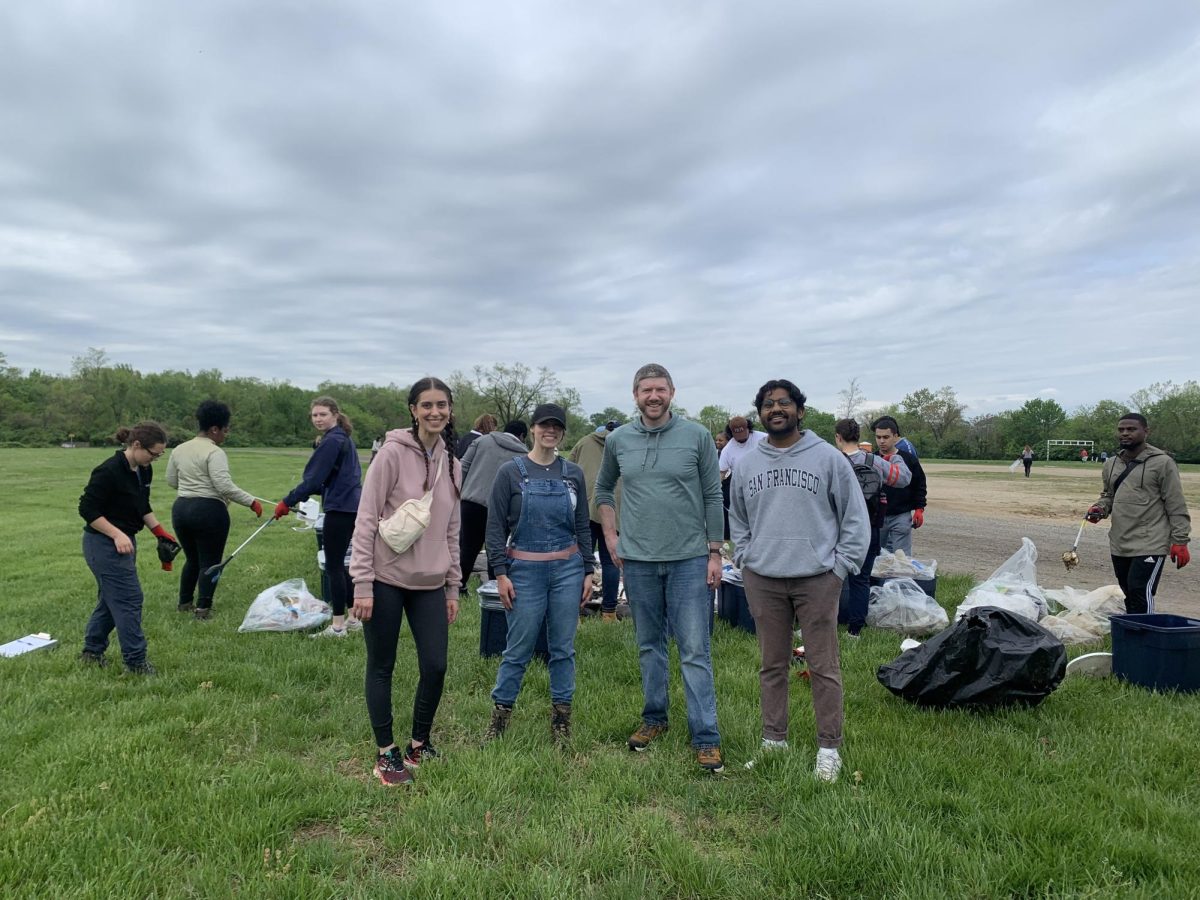Georgetown University Student Association president Juan Martinez (SFS ’20) and vice president Kenna Chick (SFS ’20) endorsed a proposed student referendum to create a semesterly fee that would go toward a fund to benefit descendants of the GU272 on Thursday. The pair announced their support four days after the GUSA senate delayed a vote on the referendum.
After postponing its Jan. 27 vote, the GUSA senate is now set to vote Feb. 2 on whether to hold the referendum to establish the fee. The mandatory fee of $27.20 per semester would be added to students’ tuitions and go toward a reconciliation fund to support the development of the descendants of the 272 enslaved individuals sold in 1838 by the Maryland Society of Jesus to financially sustain Georgetown.
The proposed GU272 reconciliation board of trustees, which would be made up of students and descendants, would oversee the allocation of the funds. If the referendum earns a majority of votes, the proposed reconciliation fund would still also require approval from the GUSA senate and the university’s board of directors.

Because reconciliation with descendant communities is central to the character and identity of the university, the referendum should occur to allow students the chance to offer their input, the executives wrote in a Jan. 31 statement.
“We encourage the senate to prioritize the importance of giving the student body a vote on this referendum in their debates and discussions,” Martinez and Chick wrote. “The student body should be able to have their voice heard; we urge the senate act accordingly.”
Students, GUSA senators, and members of the GU272 Advocacy Team, a group of students who advocate on campus for students and began the push for the referendum provided their input at Sunday’s meeting of the GUSA senate. After 90 minutes of debate and multiple proposed amendments at its Sunday meeting, the senate voted to table the act 15-11.
Amendments to the bill added term lengths to students appointed to the GU272 reconciliation board of trustees and gave the GUSA president the power to appoint students to the board, among other provisions.
The proposal does not currently possess the support of a majority of GUSA senators, though multiple senators declined to state their position.
Those advocating for the proposal said it offers a path for Georgetown to reconcile with the descendants of the GU272.
“The involuntary sale of their ancestors is what enables the existence of our university, and I encourage us to remain cognizant of this reality throughout our conversation about this referendum,” GU272 Advocacy Team member Hannah Michael (SFS ’21) said at the senate meeting.
The 1838 sale brought in $3.3 million, when adjusted for inflation, allowing the university to pay off its debt.
Though former GUSA senator Sam Appel (COL ’20) sponsored the GUSA legislation, the GU272 Advocacy Team began its push for a referendum on the reconciliation fund in fall 2018.
Appel introduced the bill to the GUSA senate’s ways and means committee, where it was delayed for a vote before being passed unanimously Jan. 23 for referral to the full senate. Appel resigned from the GUSA senate Monday and declined to comment on reasons behind his resignation.
Appel said the financial aid office indicated that those receiving financial aid from the university would not have to pay the fee, but the board of directors has not made its stance on the referendum clear.
Several GUSA senators expressed opposition to the proposal. Some senators, including Gary Xie (SFS ’19), said they would prefer a voluntary contribution instead of a mandatory fee.
“If we’re making Georgetown students pay, I think that inevitably creates a lot more tension than we seek to address,” Xie said.
GUSA Senator Harrison Nugent (SFS ’20) said he opposed the motion because there were not enough constraints on the fund’s expenses.
“My big concern with this is that there aren’t enough regulatory guidelines or explicit proposals for spending this money for the board of trustees to accept it,” Nugent said.
The referendum should take place to understand more accurately the wishes of the entire student body and not simply the GUSA senate, according to Michael.
“I think the senators, regardless of what they think about this act, should support the referendum so students can engage in this dialogue,” Michael said. “There are a lot of students who are not represented, especially students of color, specifically black students, to whom this legacy is particularly important.”
However, much of the debate among senators centered around the proposed reconciliation fund itself.
The university is working to reconcile with its legacy of slavery through a process that includes recommendations from the Working Group on Slavery, Memory and Reconciliation and new ideas from the GU272 descendants, according to Matt Hill, a university spokesperson.
“We appreciate the engagement and support of students and GUSA and will continue to consult with students and other members of the university community as we work in partnership with Descendants on a process that recognizes the terrible legacy of slavery and promotes racial justice in southern Louisiana, southern Maryland and throughout the nation,” Hill wrote in an email to The Hoya.
The university founded the Working Group in the fall of 2015 to engage members of the community in dialogue and outline recommendations to reflect on the university’s history of slavery. The Working Group released a 2016 report that outlined recommendations for how the university should proceed in acknowledging its relationship with slavery, including financial aid for descendants.
Advocates are open to input from GUSA senators to improve the proposal, so long as they are not trying to undermine the act itself, according to Elizabeth Thomas (GRD ’19), a descendant of the GU272. Thomas said some GUSA senators are not taking this issue seriously.
“I wish that some of these senators would have taken more time to read into the referendum, because there were a lot of comments or questions that were addressed that were clearly stated in the referendum,” Thomas said in an interview with The Hoya.
GUSA Senator Hayley Grande (COL ’21), who declined to comment on whether she would support the bill, said there was little left to uncover through discussion.
“I feel all the arguments were put on the floor. No one was adding information, so now was the time,” Grande said after the meeting in an interview with The Hoya.
The delay offers time to improve the bill and facilitate cooperation, according to GUSA Senator Dylan Hughes (COL ’19), who supported the bill as it came out of the meeting Sunday.
“A lot of people, as we saw here, had ideas on improvements to make, but they couldn’t agree on those improvements,” Hughes said in an interview with The Hoya. “So it’s better to take more time to talk that out rather than rush it.”
The opportunity to financially contribute to the development of the descendant community presents a historic moment that is overdue, according to Mélisande Short-Colomb (COL ’21), who is a descendant of the GU272 and supports the referendum.
“As Georgetown students voting yes on this referendum, we put ourselves in the position of doing what has never been done in this country,” Short-Colomb said.




















